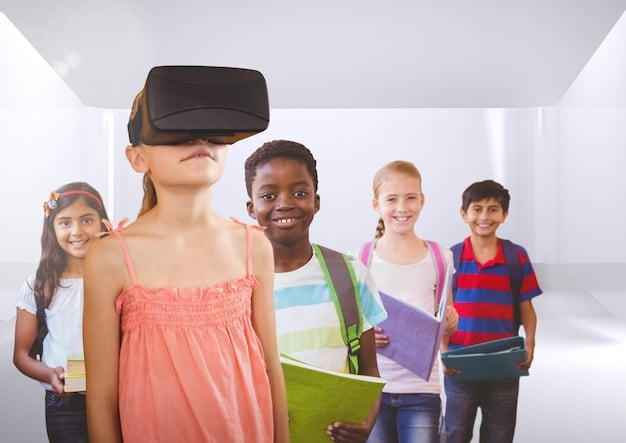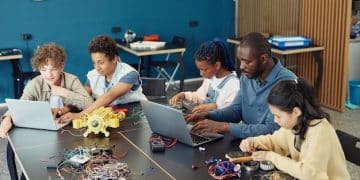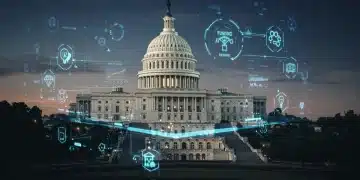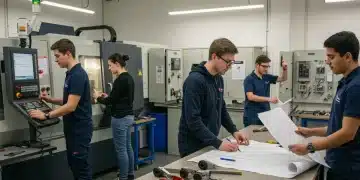Schools & Future Work: Skills-Based Programs for Success

Schools are increasingly adopting skills-based programs to equip students with competencies such as critical thinking, digital literacy, and adaptability, which are crucial for navigating the rapidly evolving job market of the future.
The future of work demands a different kind of preparation than traditional schooling provides. To meet this need, schools across the US are implementing innovative, how are schools preparing students for the future of work with new skills-based programs? This shift aims to equip students with practical skills that will make them competitive and successful in the ever-changing job market.
The Evolving Landscape of Work and Education
The world of work is undergoing a rapid transformation, driven by technological advancements, globalization, and shifting economic landscapes. Consequently, traditional education models are being challenged to adapt and better prepare students for the demands of the future. This section explores the key trends shaping the future of work and the imperative for educational institutions to evolve.
Technological Disruption and Automation
Automation and artificial intelligence are reshaping industries, leading to the displacement of some jobs and the creation of new roles requiring advanced technological skills. Educational programs must prepare students not only for current technological demands but also equip them with the adaptability to learn and master new technologies throughout their careers.
The Rise of the Gig Economy and Flexible Work
The gig economy and remote work arrangements are becoming increasingly prevalent. Students need to develop skills that enable them to thrive in these flexible work environments, such as self-management, digital communication, and project-based collaboration.
- Adaptability and lifelong learning are crucial in a rapidly changing job market.
- Digital literacy is essential for navigating technology-driven workplaces.
- Problem-solving skills help tackle complex challenges in any industry.
- Collaboration and communication are key for teamwork and remote work.
In response to these changes, schools are revamping their curricula to focus on skills that are transferable across different industries and job roles. This approach ensures that graduates are well-prepared for the dynamic nature of the modern workplace.
Identifying Key Skills for the Future Workforce
To effectively prepare students for the future of work, it is essential to identify the core competencies that will be most valued by employers. These skills extend beyond traditional academic knowledge, encompassing a range of abilities that enable individuals to adapt, innovate, and thrive in a rapidly changing environment. This section will explore some of these crucial skills.

Critical Thinking and Problem-Solving: These skills enable individuals to analyze information, evaluate arguments, and develop effective solutions to complex problems. Employers value critical thinkers who can make informed decisions and contribute to innovative problem-solving.
Digital Literacy and Technological Proficiency: As technology continues to permeate every aspect of work, digital literacy has become indispensable. Students need to be proficient in using digital tools, accessing and evaluating online information, and understanding the ethical implications of technology.
Collaboration and Communication: The ability to work effectively in teams, communicate ideas clearly, and engage in constructive dialogue are essential for success in collaborative work environments. These skills are particularly important in remote and distributed teams.
- Creativity and innovation drive new ideas and solutions.
- Emotional intelligence helps navigate interpersonal relationships in the workplace.
- Adaptability and resilience enable individuals to thrive in uncertain environments.
By focusing on these core competencies, schools can equip students with the essential skills they need to succeed in a wide range of future careers.
Integrating Skills-Based Learning into the Curriculum
Integrating skills-based learning into the curriculum requires a shift from traditional, content-focused instruction to pedagogical approaches that emphasize the application of knowledge and the development of practical competencies. This section delves into strategies and methods schools are using to integrate these skills into their educational programs.
Project-Based Learning (PBL)
PBL involves engaging students in real-world projects that require them to apply their knowledge and skills to solve authentic problems. This approach fosters critical thinking, collaboration, and creativity, as students work together to develop solutions.
Experiential Learning and Internships: Experiential learning provides students with opportunities to apply their knowledge and skills in real-world settings. Internships, apprenticeships, and volunteer experiences offer invaluable insights into the world of work and help students develop professional skills.
Simulations and Scenario-Based Learning: Simulations provide students with immersive experiences that replicate real-world situations. By engaging in these scenarios, students can practice critical thinking, problem-solving, and decision-making in a safe and controlled environment.
- Incorporate real-world projects and case studies.
- Foster collaboration and teamwork through group assignments.
- Use technology to enhance learning and develop digital skills.
- Provide opportunities for reflection and self-assessment.
By integrating these strategies into the curriculum, schools can ensure that students are actively engaged in developing the skills they need to succeed in the future.
The Role of Technology in Skills-Based Education
Technology plays a crucial role in skills-based education by providing tools and platforms that enhance learning, facilitate collaboration, and enable personalized instruction. The integration of technology can transform the learning environment and better prepare students for the digital demands of the future workforce. This section examines the various ways technology supports skills-based learning.
Online Learning Platforms and Resources
Online learning platforms provide access to a vast array of educational resources, including courses, tutorials, and simulations. These platforms enable students to learn at their own pace and access learning materials anytime, anywhere.
Virtual Collaboration Tools
Virtual collaboration tools, such as video conferencing, online whiteboards, and project management software, enable students to work together on projects and assignments, regardless of their physical location. These tools foster teamwork, communication, and digital literacy.

Data Analytics and Personalized Learning: Data analytics tools enable educators to track student progress, identify learning gaps, and tailor instruction to meet individual needs. This personalized approach ensures that students receive the support they need to master essential skills.
- Utilize digital tools for research and information gathering.
- Develop digital communication and collaboration skills.
- Employ data analytics to personalize learning experiences.
By leveraging technology effectively, schools can create engaging and effective learning experiences that prepare students for the digital age.
Collaboration Between Schools and Industry
Effective skills-based education requires close collaboration between schools and industry to ensure that curricula are aligned with the needs of employers and that students have opportunities to gain real-world experience. This collaboration can take many forms, including internships, guest lectures, advisory boards, and joint research projects. This section explores the benefits of school-industry partnerships.
Internships and Apprenticeships
Internships and apprenticeships provide students with valuable opportunities to apply their knowledge and skills in real-world settings. These experiences offer insights into industry practices and help students develop professional skills.
\
Guest Lectures and Workshops
Industry professionals can bring their expertise and insights into the classroom through guest lectures and workshops. These presentations can expose students to current industry trends and provide them with practical advice on career paths.
Advisory Boards and Curriculum Development
Industry representatives can serve on advisory boards to provide input on curriculum development and ensure that educational programs are aligned with the needs of employers. This collaboration helps schools stay abreast of industry trends and prepare students for emerging job roles.
- Align curricula with industry needs through expert input.
- Provide students with real-world experiences and mentorship.
- Foster ongoing dialogue and collaboration between educators and employers.
By forging strong partnerships with industry, schools can ensure that their educational programs are relevant, responsive, and effective in preparing students for the future of work.
Case Studies: Successful Skills-Based Programs
Numerous schools and educational institutions have successfully implemented skills-based programs that have yielded positive outcomes for students. These case studies offer valuable insights into the approaches, strategies, and best practices that can be replicated by other institutions. This section explores a few examples of successful skills-based programs.
High-Tech High (California)
High-Tech High is a network of charter schools in California that focuses on project-based learning and real-world applications. Students work on interdisciplinary projects that require them to apply their knowledge and skills to solve authentic problems. The school has a strong track record of preparing students for college and careers.
P-TECH (Pathways in Technology Early College High School)
P-TECH is a public-private partnership that provides students with the opportunity to earn a high school diploma and an associate’s degree in a STEM field. The program combines rigorous academics with real-world work experience, preparing students for high-skilled jobs in the technology sector.
Big Picture Learning: Big Picture Learning is a network of schools that emphasize personalized learning and student-driven projects. Students work closely with mentors and develop individualized learning plans that are aligned with their interests and goals.
- Project-based learning fosters critical thinking and problem-solving.
- Industry partnerships provide real-world experiences and networking opportunities.
- Personalized learning caters to individual student needs and interests.
By studying these successful models, schools can gain inspiration and guidance for implementing their own skills-based programs.
| Key Point | Brief Description |
|---|---|
| 💡 Skills-Based Learning | Focuses on practical skills like critical thinking and digital literacy. |
| 🤝 Industry Collaboration | Partnerships provide real-world experiences for students. |
| 💻 Technology Integration | Enhances learning and prepares students for digital demands. |
| 📚 Curriculum Evolution | Adapting to meet the changing needs of the workforce. |
Frequently Asked Questions
▼
Skills-based learning is crucial because it equips students with practical competencies such as critical thinking, problem-solving, and digital literacy, essential for navigating the modern workforce.
▼
Examples include project-based learning, internships, apprenticeships, and simulations that provide real-world experiences and foster collaboration and communication.
▼
Technology provides tools and platforms for online learning, virtual collaboration, and personalized instruction, enhancing engagement and accommodating individual learning needs.
▼
Industry partnerships offer insights into current trends, internships, and curriculum advice, ensuring educational programs align with employer demands and prepare students effectively.
▼
Skills-based education enhances employability, fosters adaptability, promotes innovation, and equips students with essential tools for success in rapidly evolving professional landscapes.
Conclusion
As the world of work continues to evolve, schools are adapting by integrating skills-based programs into their curricula. By focusing on critical thinking, digital literacy, collaboration, and real-world experiences, educators can better prepare students for the challenges and opportunities of the future workforce.





